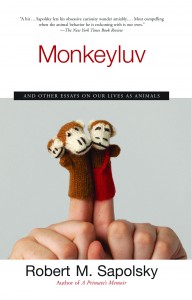 Robert Sapolsky is a neuroendocrinologist (someone who studies the interactions between the nervous and endocrine systems) and a professor of biology, neuroscience and neurosurgery, though it would be easier – if equally intimidating – to simply call him a genius. It’s an unsatisfactory word, I admit, thrown out too easily and too often, but how else would you describe someone who was writing letters to primatologists when he was 12 years old and teaching himself Swahili in high school, all so that he could one day run off to Africa to spend eight to ten hours a day studying apes, four months of the year, for 25 straight years? Besides, he has it in writing: in 1987, he was awarded a MacArthur “Genius” Fellowship. His course on Human Behavioral Biology, available in its entirety on YouTube, was my introduction to him and is, in my humble opinion, one of the most enlightening ways anyone could spend ~50 hours. To his formidable intelligence I would only add that he is funny, soft-spoken and articulate, qualities that matter a great deal in anyone seeking to explain the complexities of our biology to a wider audience.
Robert Sapolsky is a neuroendocrinologist (someone who studies the interactions between the nervous and endocrine systems) and a professor of biology, neuroscience and neurosurgery, though it would be easier – if equally intimidating – to simply call him a genius. It’s an unsatisfactory word, I admit, thrown out too easily and too often, but how else would you describe someone who was writing letters to primatologists when he was 12 years old and teaching himself Swahili in high school, all so that he could one day run off to Africa to spend eight to ten hours a day studying apes, four months of the year, for 25 straight years? Besides, he has it in writing: in 1987, he was awarded a MacArthur “Genius” Fellowship. His course on Human Behavioral Biology, available in its entirety on YouTube, was my introduction to him and is, in my humble opinion, one of the most enlightening ways anyone could spend ~50 hours. To his formidable intelligence I would only add that he is funny, soft-spoken and articulate, qualities that matter a great deal in anyone seeking to explain the complexities of our biology to a wider audience.
Monkeyluv And Other Essays On Our Lives As Animals is a collection of his writings from academic and popular periodicals, on topics as wide-ranging as a discussion of beauty prompted by People magazine’s annual “50 Most Beautiful People” article to a chilling account of Münchausen by proxy, a disorder in which a caregiver (most often a mother) deliberately exaggerates, fabricates or even inflicts injury on a child to gain the sympathies of the medical community. Two essays in particular should be required reading. “The Genetic War Between Men And Women” gives the lie to that most stupid of modern leftist mantras, that “gender is a social construct.” The basic premise of the essay is that men and women have different evolutionary goals owing to the constraints placed on them by their separate reproductive systems, and while this was not new to me at all, the extent to which these two goals are in conflict, down to the cellular level, had escaped me. The second essay, “A Gene For Nothing,” discusses what exactly genes do, and why it is a fallacy to think of the debate for human nature in terms of “nature vs nurture.” Genes, Sapolsky explains, do not code for behaviors; they code for proteins, which in turn create complex structures resulting in hormones and neurotransmitters, which in turn code not for specific behaviors but “tendencies to respond to the environment in certain ways.” Teasing out how evolutionary and environmental pressures act on our genes is the business of evolutionary or behavioral biology, and it is a fascinating and deeply rewarding field of study, even for a layman such as myself.
Sapolsky is among a select pantheon of contemporary thinkers that offers the greatest challenge to people of all political and religious backgrounds. It is an uncomfortable thing to think of human beings in the same terms we discuss animals, or even bacteria, but we bear the stamp of our evolutionary heritage as surely as any mollusk, tiger or chimpanzee, and our biology has had a greater say than we realize in shaping our society. On this journey of discovery, there are no better guides than Robert Sapolsky.